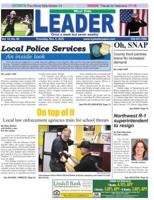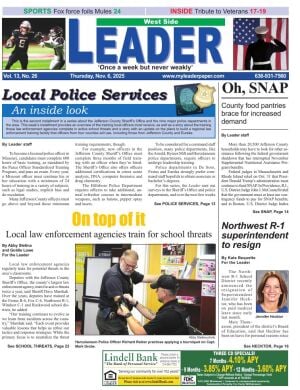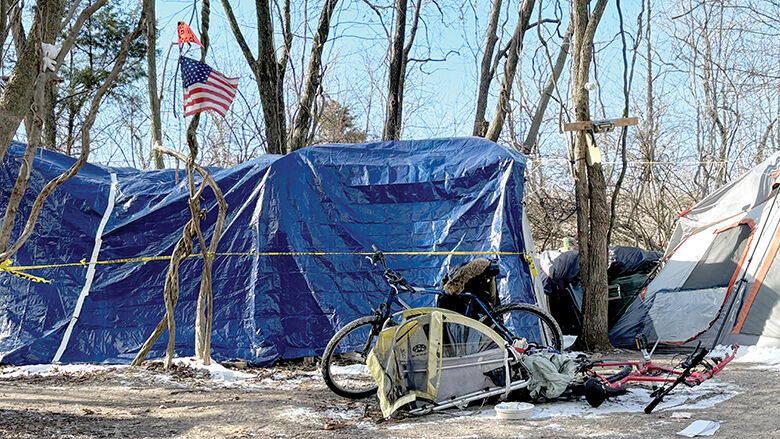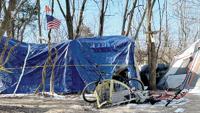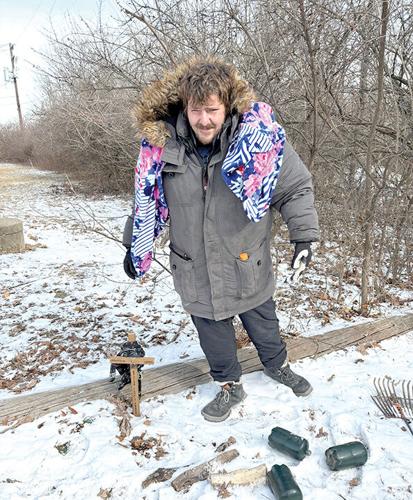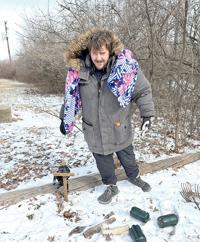Braving the bitterly cold weather over the past couple of weeks was brutal for most people. For Jefferson County residents who are unhoused, it was potentially life-threatening.
Local organizations and agencies scrambled to figure out ways to help those experiencing homelessness with limited funding, and the Jefferson County Coalition for the Unhoused (JCCU) tried to find ways to help provide emergency short-term hotel stays.
At one encampment in Jefferson County hidden behind the busy Hwy. 30 corridor, about 27 unhoused people hunkered down in tents covered by heavy tarps and fueled by propane. The number had increased from the camp’s usual 20 residents since area organizations have been supplying the people staying there with food and resources.
Despite that help, it’s hard living outdoors during frigid weather, said Josh Carmon, 42, who has been staying at an encampment in Jefferson County for 17 months.
“This winter, it has been really rough, just brutal,” he said. “It has been too cold to sleep. It was scary because it was indescribably cold. You wonder if you’re going to make it.”
Tommy Marler, 32, who has been unhoused for six years and has been living at an encampment in the county for more than two years, agreed.
“Living outdoors in the cold is pretty treacherous. If you are not careful, you could definitely wake up with hypothermia,” he said.
Karla Lefarth, who visits the camp twice a week to provide propane and supplies, said she wants to see all those in the encampment placed in housing.
“I want to get everyone out of there,” said Lefarth, who delivered food, warm clothing and supplies to the encampment on Jan. 21 with volunteers from Journey to a New Life ministry of the First Baptist Church of House Springs.

Tommy Marler, 32, has been unhoused for six years and currently lives in an encampment in Jefferson County. The small cross is a memorial for his dog, Hooch, who was living there with him but recently was hit by a car and killed.
Lefarth, who began the ministry in 2023 with her husband, Brad Lefarth, and a team of volunteers, said she records each person’s basic information, along with their goals.
“We are not just meeting their basic needs We are developing relationships with them,” she said. “To me, that’s one of the most important things because they start to trust us and their walls come down.”
Pastor Dan Ross of New Hope Fellowship Church in High Ridge, a member of the JCCU leadership team, said the coalition does not receive or disburse funding, but two of its members are designated to receive funds for emergency housing for those who are homeless.
The New Hope Outreach Center, a ministry of New Hope Fellowship Church, and the Jefferson County Salvation Army, which is based in Arnold, receive and provide funding for emergency hotel stays based on referrals from the coalition’s members and other county agencies. However, there aren’t a lot of funds for emergency housing, said Casey Kindt, director of the New Hope Outreach Center.
As the forecast projected very cold weather, “I started getting calls and emails about emergency hotel stays, but we have limited funds available for those,” Kindt said. “Sadly, when the funds are depleted, we have to turn people away.”
The dangers for people who live unsheltered in cold weather include hypothermia and frostbite, particularly on fingers and toes. According to the National Coalition for the Homeless, each year 700 people experiencing homelessness in the U.S. die from hypothermia.
The actual number of Jefferson County residents who are unhoused is not known. Besides encampments, unsheltered people live may live in cars, abandoned buildings or under bridges.
“We are estimating approximately 70 unhoused people living in Jefferson County,” Jefferson County Sheriff Dave Marshak said.
Ross said he believes it’s a far higher number.
“The number of unhoused people in the county is easily 200 to 250. Just in High Ridge, there are close to 50 people,” he said.
“We are seeing more unhoused people all the time,” said Linda Martinson of 25:35 Ministries, an outreach program that helps about 200 unsheltered homeless people weekly. “We now go in two directions, with one group staying in Jefferson County and the other going into St. Louis,”
A group of volunteers were scheduled to try to count the homeless population in Jefferson County during the annual Point-in-Time (PIT) count on Wednesday, after Leader deadline. Typically gathered nationwide in the last week of January, PIT counts are one of several factors tied to the U.S. Department of Housing and Urban Development’s (HUD) federal funding allocations to address the homelessness problem.
The dusk-to-dawn count provides a snapshot of the county’s homeless population on a single night. PIT tracks the number of people who are homeless, their demographics and needs. It tells what services they use, whether they want housing and how long they’ve been unhoused.
Gathering accurate information isn’t easy, said PIT organizer Karen Ferrell, housing manager for Compass Health.
“The problem is a lot of homeless people don’t want to be found that night or anytime,” she said.
In 2023, the PIT count for Jefferson County reported 51 people experiencing homelessness. That number included 24 people who were unsheltered and 27 people who were sheltered, with 20 of those in emergency shelters and seven in transitional housing.
“I believe these numbers are very low,” Ferrell said. “We had identified a homeless camp with at least 35 people living in it, but there were only two people present in the camp on the night of the count.”
She said steps are being taken to improve the count this year.
“We have planned events outside the camps to protect the privacy and safety of the unhoused population,” she said.
The options are slim for the unsheltered in Jefferson County when extreme weather hits. The county has no emergency or transitional shelter. There are few warming stations, all of which close at dusk.
The Jefferson County Sheriff’s Office redeployed its Homeless Outreach Team in November 2023 after a nearly two-year hiatus due to staff shortages in the department. The program served JCCU members by providing law enforcement resources, encampment well-being checks and screenings of the unhoused prior to emergency placement in hotels.
“The biggest takeaway is that for some, the individual’s situation that resulted in them being unhoused is as complex as the remedies,” Marshak said. “Many had their own stories, their own reasons for their choices, whether they were personal decisions or in part were attributed to an underlying mental health or drug addiction.”
Many of those who are unsheltered have fallen on hard times and are seeking help, according to those who provide services for the homeless on an ad hoc basis.
Some of the obstacles people who are homeless face in Jefferson County include a shortage of affordable housing and limited public transportation, which makes it challenging to reach resources.
Thousands are on a waiting list for HUD Section 8 rent vouchers, and the list currently is on hold, which means no one else can be added to it and no new vouchers are being distributed, demonstrating that the demand for housing outnumbers supply.
“We will reopen when HUD advises us to do so,” said Diana Hayes, acting CEO for the Jefferson-Franklin Community Action Corps. “At last count, there were about 5,517 people on the list.”
On a positive note, Hayes added, the agency has begun holding meetings with landlords to explain the process they must complete in order to be approved to accept the housing vouchers.
The JCCU, formerly known as the Jefferson County Homeless Coalition, has reorganized to streamline services and more effectively promote and help coordinate the efforts organizations and agencies provide for the unhoused population.
Ross said the goal is to fill gaps by mobilizing resources, fostering hope and advocating for the unhoused and those at risk of losing housing in Jefferson County.
“We are seeing more community people, both individuals and organizations, wanting to get involved in helping the unhoused in our county,” he said.
More than 40 people representing organizations around the county that serve the unhoused attended the JCCU’s Jan. 18 meeting at New Hope Fellowship Church. The monthly meetings rotate around locations throughout the county, with work committee meetings held every other month.
Brian Pogue and volunteers with the Hands That Help nonprofit group also are trying to help the unhoused in High Ridge.
“The highest homeless population in Jefferson County is in High Ridge,” Pogue said. “We’ve been visiting the camps for about a year and going every day during this weather to make sure they have propane tanks and are warm. We also have a meal train that delivers warm meals donated from individuals and area businesses.”
Providing hope to those who have virtually given up is important, Lefarth said.
“Some of them have real heartbreaking stories. It’s not about how they got there or the bad decisions they made. It’s about how these people still need to know somebody cares and that there’s hope. That’s what we try to provide,” she said.
